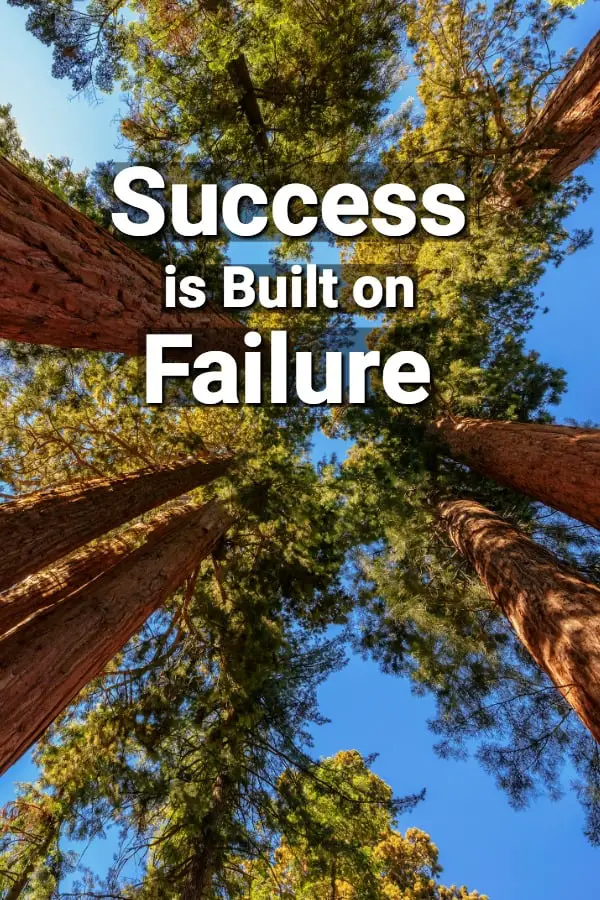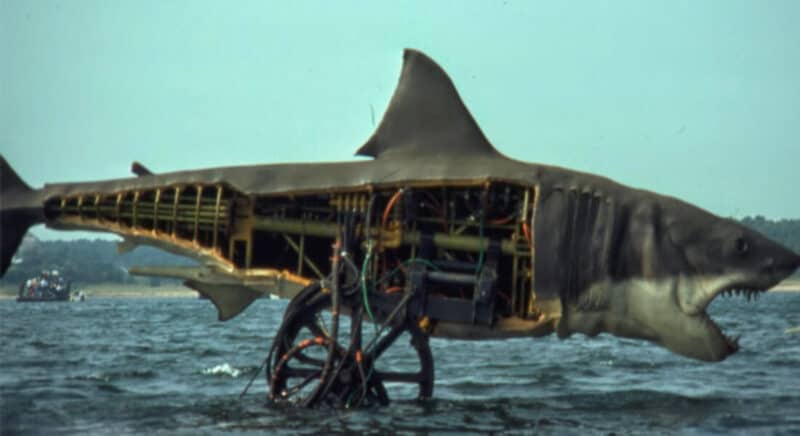“This post may contain affiliate links. Please read my disclosure for more info.
 What would you consider your biggest failure? A job loss, a failed business or relationship? What makes this particular failure stick out?
What would you consider your biggest failure? A job loss, a failed business or relationship? What makes this particular failure stick out?
Is it what you lost in the process?
What if your biggest failure turns out to be something you didn’t do?
Surprisingly, one of the biggest regrets people have later in life isn’t what they tried and failed at. It’s what they thought about trying, but never pulled the trigger on. Or what they failed at and gave up too easily.
I had what I considered to be a failure, and I assumed I’d regret it for decades. Then almost accidentally, I discovered that failure is just a step along the way to success.
For a long time, I considered my experience with high school sports a failure. It’s not that I quit easily. I endured some brutal cross country practices into my junior year before I left.
Practices where we were challenged to run distances and track laps that we’d never have imagined we were capable of. But when it came to the meets, I was an eternal back of the packer.
It wasn’t that I couldn’t handle the distance – most people can train to run a few miles within a few weeks. But to run it competitively, it was practically a sprint the whole way.
Guts and determination play a big part in your success in a sport like cross country. But so does the right combination of fast-twitch muscle and cardio vascular makeup. Whatever I lacked, I quit in the middle of junior year. I considered it a failure, and never went out for another team.
Not Strength…Perseverance
It’d be years before I’d realize that most success comes only after repeated failure. I didn’t understand that whatever the challenge – physical, financial or personal, failure is inevitable. It’s the fear of failure, that holds us back. Or in my case, the fear of trying again.
Those practices would eventually benefit me, but it would take awhile.
Over the next several years, I’d find myself drawn to stories of people who encountered failure after failure, when finally, they succeeded beyond anything they would have expected.
- People like Stephen King, who lived in a trailer, pecking out stories on a borrowed typewriter. His first novel Carrie, was rejected 30 times before being published. He’s since sold 350 million books, many of them made into movies, like one of my favorites, The Shawshank Redemption.
- I visited Disney World and read how Walt Disney was fired from his job as a young reporter at the Kansas City Star. His boss said he “lacked imagination and no good ideas.”
- And I read how Steven Spielberg was rejected twice from the USC film school. But despite the rejections he never gave up. His films have now grossed over $8.5 billion.
The notion that success could be right around the corner would’ve been tough for Stephen King to imagine, as he crumpled paper after paper into the wastebasket.
And as Stephen Spielberg read his rejection letter from the USC film school, he couldn’t have imagined that 10 years later, at age 27, he’d be directing what would become the highest grossing film of all time, to that point – Jaws.
What about you? Have you experienced a failure at something that still sticks with you?
Following Your Passions No Matter What
As a 22 year old TV reporter, Oprah Winfrey was fired because as her boss put it, she “got too emotionally involved with her stories, and wasn’t right for TV”.
Most people would have taken that criticism to heart, and carried it with them throughout their career. Always completing projects, but remembering to pull back at any hint of emotion or human connection.
Isn’t it ironic, that later in her career, when Oprah earned a chance to host her own show, she became the most successful interviewer in television history because she developed the show around her passion – the human experience.
Why Most People Give Up
Suppose Oprah listened to her manager and went on to become a mid-level TV executive, never following her passion for personal development and growth? Would she have sat in her rocker one day, thinking “what if”?
What if Walt Disney listened to his manager’s criticism and went on to become an insurance salesman or an accountant?
Most of us do stop at the first few hurdles. We don’t like to be told we’ve failed, especially when it’s directed at the things we hold closest.
As infants and toddlers, we fail all day long in our attempts to learn basic skills like eating, crawling, walking and talking. But it’s because our parents allow us to fail repeatedly, that we experience the most rapid period of growth in our lives.
Once we go out and encounter the world, we’re taught to avoid failure at all costs. We need to get good report cards even in pre-school. We receive “participation trophies” in sports. Some child sports leagues don’t even keep score, so nobody goes home feeling any hint of failure.
As a parent, it’s tough to see my children experience failure in anything. It’s a delicate balancing act, knowing when to step in, or when to hold back and allow your child to develop some coping skills and resiliency.
But if we’re never allowed to experience failure, it’s hard to develop the persistence to work through obstacles.
So for many people, a few early failures is enough to give up and change course. And for many more, just the fear of failure prevents us from even trying to pursue something new.
So What Made Them Finally Succeed?
Oprah, Stephen King and Walt Disney all experienced crushing failures early in their career. The difference is, they were never convinced, like many of us, to avoid failure at all costs. They kept pushing. They treated failure, and even repeated failure, as part of the process.
They each had a vision and knew it was their calling. They treated failure and rejection as a learning experience, but didn’t let it affect their internal compass. They accepted failure, learned from it and continued with the same vision, but in another direction.
Sometimes it’s Just Your Approach

In Steven Spielberg’s first major movie, Jaws, he experienced so many failures with the mechanical shark, that he was forced to step back and improvise. After all, how can you make a shark movie without the shark?
So scenes were changed to “suggest” the appearance of the shark. Spielberg made adjustments onsite and used some of the tools employed by Alfred Hitchcock so successfully. Tools like anticipation, suspense, and soundtrack. Jaws then went on to become the highest-grossing movie of all time to that point.
Sometimes the Person in Authority is Full of Sh*t
The author, JK Rowling was divorced, with a young daughter and unemployed in the early 1990’s. She had to resort to welfare benefits to support her daughter.
The idea for her Harry Potter book came to her while commuting on a train one day. Over the next few years, she struggled to find time to write while caring for her daughter and working in a church.
All twelve major publishers rejected her script in 1995. But a small company – Bloomsbury, agreed to publish 1000 copies, half of which were for libraries. Harry Potter went on to win the Children’s Book of the Year award, and she’s since sold over 400 million books!
JK Rowling, Walt Disney, and Stephen King all figured out that sometimes the gatekeepers we encounter may be wrong. They don’t always read the desires of consumers correctly. It’s no big deal for them, just another rejection. And most of us will accept the “expert’s” conclusion.
What Are The Keys to Overcoming Failure?
Henry Ford launched two automobile companies, both of which failed. On his third try, he focused on mass-producing cars that customers wanted and had the ability to buy, and Ford Motor Company took off.
He learned from each failure, adjusted his plan and tried again. Ford was quoted later in life, “failure is the opportunity to begin again, more intelligently.”
So the common path from failure to success seems to be:
- First, do what matters to you.
- Know that it won’t be universally accepted, and expect rejection.
- Recognize why your effort failed – determine if it’s something you have control over.
- Determine what needs to be done differently next time.
- Repeat your efforts with lessons learned.
Doing what matters to you seems to be a key to not only overcoming failure, but being truly successful. Whether it’s teaching, selling your own creation, or designing a new iPhone.
Steve Jobs, was ousted from Apple in 1985, returned, and was appointed CEO in 1997. Asked about where he went wrong earlier in his career, he said “my major mistake during those tumultuous years: Letting a desire for profitability outweigh passion.”
But once he returned to Apple, he reduced the product line by 70%. Then he refocused on his passion – incorporating simple, elegant design into useful products. And the results were:
- The iPod
- The iPod Touch
- iTunes
- Macbook Air
- MacBook Pro
- The iPad
- The iPhone
- Apple TV
- The iMac
Failures Sweeten our Success

To truly appreciate success, it helps to know the feeling of failure. JK Rowling said:
“When you find something that matters to you, invest yourself in it and don’t be afraid to fail.”
Many successful people will look back on their most difficult struggles, and remember them as some of the most valuable growth experiences of their lives.
Entrepreneurs learn every day, there are so many things they didn’t know they needed to know. But that’s what sets them apart from someone who trades the potential for huge success for the security of a 9 to 5. An entrepreneur will experience failures every day and still see the big picture.
In a commencement speech at Harvard University, JK Rowling said, “It is impossible to live without failing at something unless you live so cautiously that you might as well not have lived at all, in which case you have failed by default.”
Look for Success Around You
Talk to someone in your life who’s been successful in some way. In their career, a hobby, sports, personal finance, a side hustle, marriage, or relationships. Ask if they’ve experienced failure along the way, and they’ll probably surprise you.
There’s a good chance that they’ll consider the obstacles and failures they’ve worked to overcome as some of the defining periods of their life.
The material rewards of success are obvious. But the successful person will be just as proud of the character and determination they’ve developed through their failures.
Knowing Why Success Matters to You
How many people have tried to quit smoking or lose weight and fail over and over. Then one day their mindset shifts, and they lose thirty pounds in a few months.
Suddenly they want the transformation, not because someone tells them to, or they think they should. They want it because their desire for success becomes more valuable than the payoff from doing nothing.
That’s the shift I experienced several years after graduating school. I wanted to be in shape again. I started to realize that I still had decades before me, and I didn’t want to spend them overweight and out of shape.
I began jogging at night, barely able to make it around the block without stopping. But this time was different. My motivation had changed. I wasn’t out there to earn recognition, or be able to say I was on a team. The coach wasn’t waiting with a stopwatch. This time I wanted it.
I was surprised to find the motivation to make a second loop, then a third, came from my old school practices. The ones where we were continually challenged to do more than we thought we were capable of. The ones I had considered a failure.
I started to understand that maybe those days weren’t a failure after all. My coach hadn’t just trained me to run several miles at a time. He trained me to challenge myself. And he gave me the knowledge that I’d always be capable of more than I thought.
My running loops grew larger and larger, until they stretched through several towns. I began entering races on the weekends.
Within about a year, I challenged myself to run the Jersey Shore Marathon. Never having run more than about 14 miles, I was able to complete it in three hours and thirty three minutes. And the only thing that kept me moving through miles 20-26 was remembering how he challenged us in school.
Next came the Marine Corp Marathon, the New York City Marathon, and dozens of other races. And though these were physical challenges, I learned that if we approach what was once a failure with a different attitude, and lessons learned, the outcome can be much different.
What About You?
Is there an experience you’ve had, that you consider a failure but still sticks with you?
Whatever stage you’re at – in school, at work, unemployed, a stressed out parent – this is a small sliver of your life. And whatever has happened so far, shouldn’t determine the next decade or two.
Remember:
- Failure is part of the process. It’s a stepping stone.
- It’s ok to be frustrated, but acknowledge the failure and determine what you need to do differently.
- Remember what Albert Einstein said, “insanity is doing the same thing over and over, and expecting a different result.”
What roadblock are you facing?
Have you considered what went wrong, or what’s stopping you, and trying again? Will you regret it if you don’t?
Whatever it is, remember that success always involves failure. Probably multiple failures. The sooner you start to fail, the closer you’ll be to success.
As Buddha said, “there are only two mistakes one can make along the road to truth; not going all the way, and not starting.”



